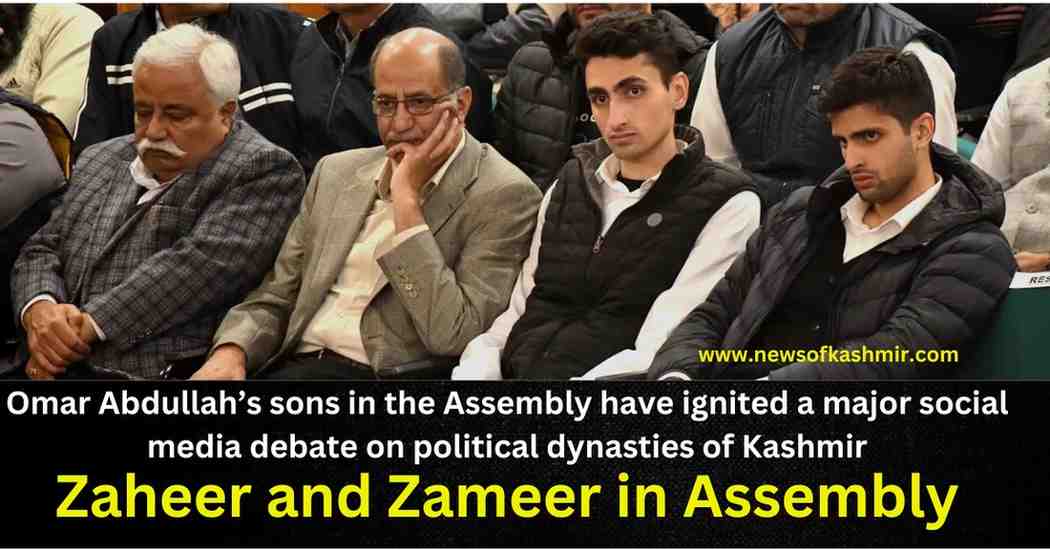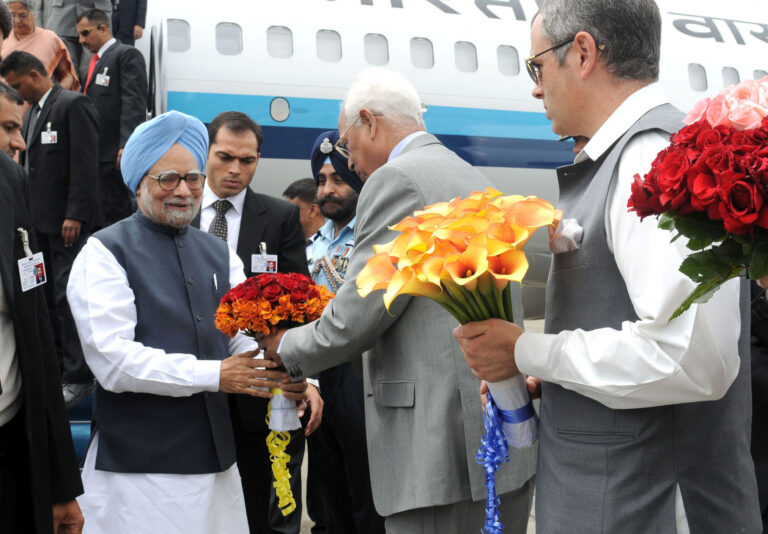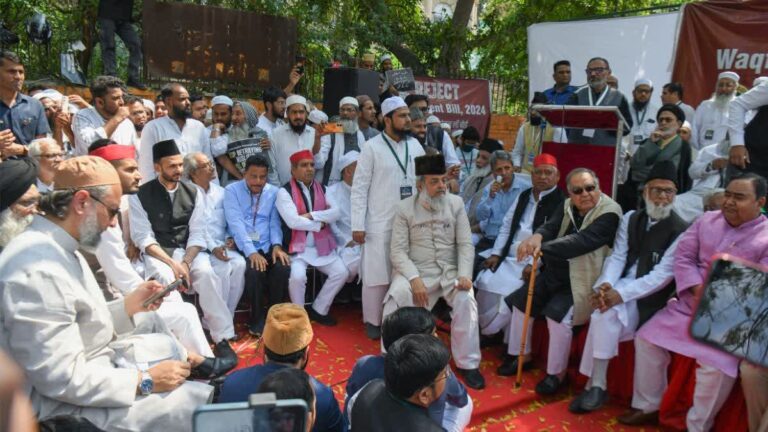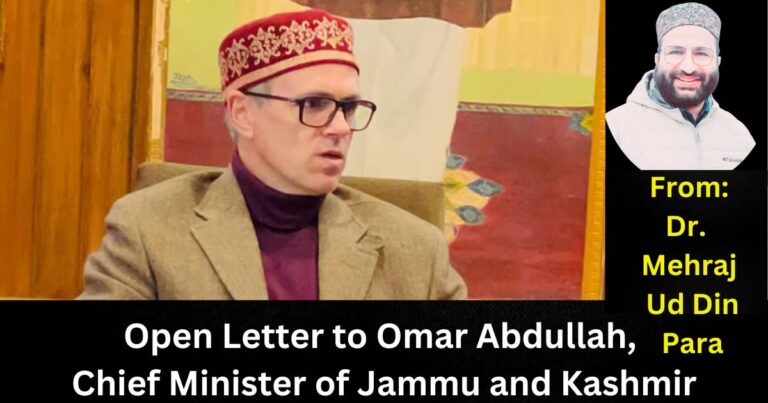Omar Abdullah’s Sons in the Assembly: The Role of Dynasties in Jammu and Kashmir’s Political Future
The political landscape of Jammu and Kashmir (J&K) has long been shaped by the influence of two prominent families: the Sheikhs and the Muftis. For generations, these families have held positions of power and shaped the region’s political direction, evoking both admiration and criticism. The recent presence of Chief Minister Omar Abdullah’s sons, Zaheer and Zameer, in the J&K Assembly has reignited discussions about dynastic politics and the future of democratic leadership in the region. Their attendance has become a symbol for some of the enduring power structures in J&K politics, with critics calling for an end to family-based succession and advocating for fresh, grassroots leadership.
Historical Background of the Sheikh and Mufti Families
The political legacy of the Sheikh family began with Sheikh Abdullah, a charismatic leader who became the “Lion of Kashmir.” Sheikh Abdullah’s vision for Kashmir was based on secularism, autonomy, and a distinct identity within India. His legacy was carried on by his son, Farooq Abdullah, and later by his grandson, Omar Abdullah. This three-generation political journey has woven the Sheikh family into the fabric of J&K’s political narrative.
Similarly, the Mufti family has played a significant role in J&K’s politics, especially since the 1980s. Mufti Mohammad Sayeed, a prominent leader, held various key positions and founded the Jammu and Kashmir People’s Democratic Party (PDP). His daughter, Mehbooba Mufti, later took over the reins, becoming one of the region’s most influential political figures. The Muftis have presented themselves as champions of reconciliation and autonomy, seeking to bridge the gap between the central government and the Kashmiri people.
The Presence of Zaheer and Zameer in the Assembly: A New Generation?
The recent appearance of Omar Abdullah’s sons, Zaheer and Zameer, in the J&K Assembly has sparked renewed interest in the future role of the Sheikh family. Seated beside CM’s advisor Nasir Aslam Wani, they observed the Assembly proceedings with curiosity, an experience likely meant to expose them to the nuances of governance.
While a National Conference leader indicated that their presence was purely educational, the media’s reaction has been mixed. For some, Zaheer and Zameer’s attendance is a sign of the fourth generation of the Sheikh family being groomed for political responsibilities. This has prompted concerns among those who view dynastic politics as an obstacle to true democratic representation, where leadership is passed down by family connections rather than merit or public mandate.
The attention surrounding their presence has led some to question the role of dynastic families in a democratic setup. Are the Sheikh and Mufti families truly fostering democracy, or are they holding on to a system that inherently favours family succession over broader representation?
The Debate: Dynastic Politics vs. Democracy
Dynastic politics is not unique to Jammu and Kashmir; it is an issue across various democracies worldwide, including India as a whole. Families like the Nehru-Gandhi dynasty have maintained an enduring influence on Indian politics, creating both support and opposition. In Jammu and Kashmir, the Sheikh and Mufti families have dominated political narratives for decades. Critics argue that this concentration of power limits opportunities for fresh leaders to emerge and weakens the democratic foundations of the region.
Those critical of dynastic politics assert that democracy should be about giving voice to the people and promoting leaders who reflect the aspirations of the broader population. They argue that the Sheikh and Mufti families’ continued dominance symbolises an entrenched political elite that may be disconnected from the ground realities and challenges faced by ordinary Kashmiris.
Supporters of these political families, however, argue that dynastic succession in politics does not necessarily undermine democracy. They claim that individuals from these families often understand the political environment deeply, which may help them lead effectively. For many, the Sheikh and Mufti families have been stabilising forces during times of turmoil, using their connections to negotiate with both the central government and local factions.
The Challenges of Political Change in J&K
Calls for new leadership in Jammu and Kashmir face various challenges. The complex history of the region, marked by conflicts, internal divisions, and unique socio-political issues, creates a challenging environment for non-dynastic leaders to rise. Security issues, ongoing regional disputes, and the need for consistent, experienced governance have made the established families seem, to some, like reliable choices.
The concept of an “outsider” leading J&K remains controversial, with some Kashmiris preferring leaders who are both familiar with the region’s history and trusted by the local population. Here, the established families often have the upper hand, as they are seen as longstanding members of the community. However, some argue that limiting leadership to these families prevents the development of a more diverse political field.
Additionally, the alignment of dynastic leaders with the central government has at times fuelled mistrust among certain groups in J&K. This has led some to question whether the Sheikh and Mufti families are truly acting in the region’s best interests or if they are merely maintaining a status quo that keeps them in power. The ongoing presence of these families has therefore become a symbol of continuity for some, but a source of frustration for others who long for change.
Voices for Change: What Do Critics Say?
Critics of dynastic politics argue that it restricts the potential for democratic reform and limits the diversity of ideas within the political landscape. They believe that the Sheikh and Mufti families should step aside, allowing other leaders from diverse backgrounds to bring new perspectives and innovative solutions to the table.
Some view dynastic politics as undermining democracy by setting a pattern where political positions are inherited rather than earned through merit or public endorsement. This, they argue, can discourage young and talented individuals from pursuing politics, knowing that family connections often determine political success. The critics’ position is rooted in the belief that Kashmir’s youth deserve a chance to shape their future without the constraints of entrenched political families.
In this context, Zaheer and Zameer’s appearance at the Assembly could be seen as an example of a political system that continues to favour the next generation of a particular family over equally capable individuals from different backgrounds.
The Role of Youth and Grassroots Movements
Jammu and Kashmir’s youth represent a large segment of the population, and their aspirations may differ from those of the older generations. In recent years, there has been a rise in grassroots movements and youth-led initiatives aimed at addressing local issues and improving community life. This represents a shift towards a more participatory form of politics that may not align with the dynastic model of leadership.
Many young people in J&K are passionate about building a future that reflects their own vision for the region, rooted in inclusivity and innovation. They seek political leaders who represent their concerns on issues like employment, education, and social justice. By supporting youth involvement and grassroots activism, J&K has the potential to develop a more vibrant political scene that accommodates a wider range of perspectives.
However, for such a shift to occur, established political families may need to make space for this emerging generation of leaders. Encouraging youth participation and fostering an inclusive political environment could be vital steps in transforming J&K’s political landscape.
A Call for Democratic Renewal in J&K
The presence of dynastic politics in J&K raises important questions about the future of democracy in the region. While the Sheikh and Mufti families have made significant contributions to J&K’s political and social development, their ongoing dominance poses challenges to the democratic process. Many argue that if J&K is to evolve, it must embrace a political system that allows fresh faces and innovative thinkers to take up leadership roles.
To move towards a more democratic future, the region could benefit from reforms that promote merit-based leadership, transparency, and accountability. This may involve encouraging political parties to select candidates based on qualifications and public support, rather than family ties. Additionally, promoting the voices of underrepresented groups, including women and minorities, can contribute to a more inclusive and responsive government.
-Conclusion: Paving the Way for a New Political Era in Jammu and Kashmir
The recent presence of Zaheer and Zameer in the J&K Assembly has reignited debates on dynastic politics and democracy in the region. While the Sheikh and Mufti families have historically played stabilising roles, there is a growing sentiment that J&K’s political landscape needs renewal. By fostering an environment where leaders are chosen based on merit, public support, and the ability to represent diverse perspectives, the region can move towards a more robust and inclusive democracy.
Ultimately, the future of Jammu and Kashmir will depend on its ability to balance respect for historical legacies with the need for democratic progress. By embracing a system that encourages broader representation, J&K can work towards a political future that honours its past while paving the way for new leaders and ideas.
(write : Sheikh Mohammad Isa)
You Might Also Like:
Late Syed Ali Shah Geelani Remembered in J&K Assembly
The Golden Essence: Saffron’s Journey from Field to Spice
J&K Industries & Commerce Directorate Mourns Passing of Khalid Majeed’s Mother
Omar Abdullah Remembers Atal Bihari Vajpayee’s efforts and unwavering commitment For J&K
Will Examine and Take Action Against Private Schools Violating Government Norms: Sakina Itoo






